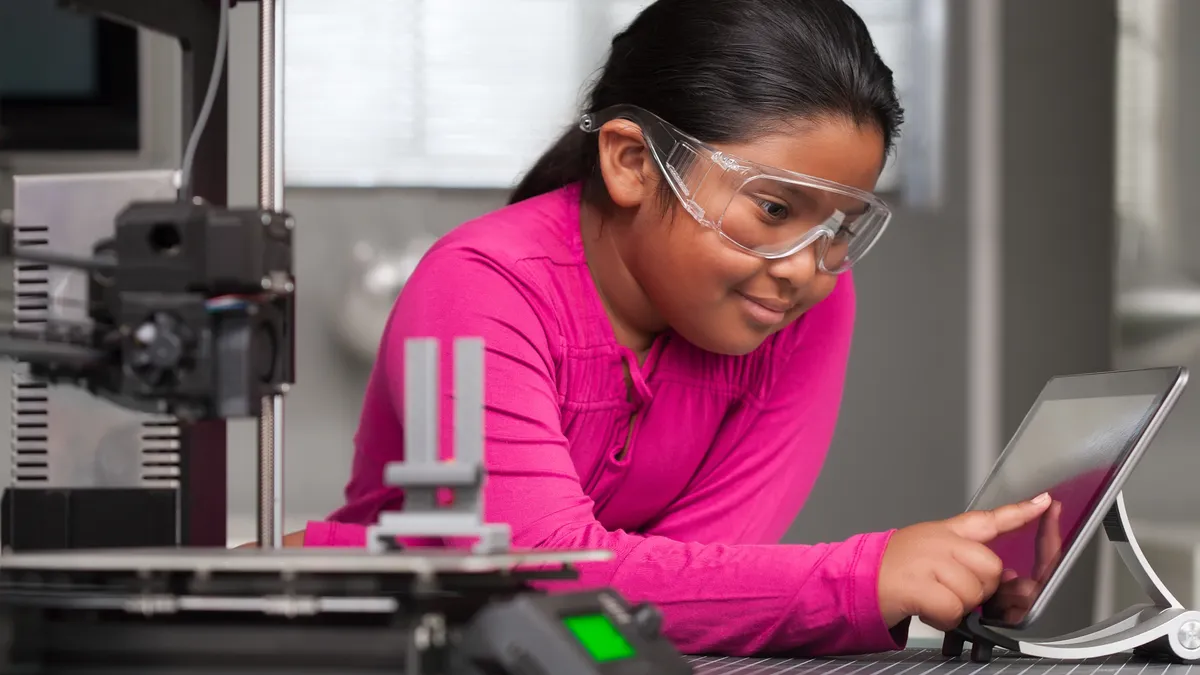Curriculum: Page 55
-
US students show low-to-medium tech skills
A 12-country international study shows just because students grow up with digital devices doesn’t mean they have "sophisticated" skills.
By Linda Jacobson • Nov. 5, 2019 -
Arts, SEL collaboration boosts school climate, assessment options
In the "whole-child" era, experts at a Turnaround Arts event described how the arts can help educators meet school goals and improve student learning.
By Linda Jacobson • Nov. 4, 2019 -
 Explore the Trendline➔
Explore the Trendline➔
 Permission granted by Benetech
Permission granted by Benetech Trendline
TrendlineSTEM
From AI to quantum physics, STEM learning opportunities in K-12 are expanding to keep pace with related fields.
By K-12 Dive staff -
Dyslexia focus produces results for a Colorado public school
The Academy for Learning, Literacy & Innovation Excellence is the state's only public school designed for students with dyslexia, with interventions like small group sessions producing higher reading scores by year two.
By Lauren Barack • Oct. 30, 2019 -
Land management partnerships allow schools to provide hands-on outdoor learning opportunities
Students are able to experience land management responsibilities, conduct conservation projects, and learn how to operate tools while also giving back to the community and developing SEL skills.
By Shawna De La Rosa • Oct. 30, 2019 -
Gallup: Pairing creativity, tech boosts student outcomes
A new report also finds that while traditional tests and rote learning are outdated, a large number of students still report spending a lot of time learning how to do well on standardized tests.
By Naaz Modan • Oct. 30, 2019 -
Research shows disconnect between results and students' perceptions of active learning
Harvard researchers find students' believe they learn better from lectures despite active learning producing better exam results, necessitating better communication of benefits.
By Lauren Barack • Oct. 23, 2019 -
Girls Who Code's Reshma Saujani: Getting girls into STEM requires paradigm shift in strategy
Mentoring and addressing stereotypes of what STEM professionals look like can help female students envision themselves in these fields.
By Shawna De La Rosa • Oct. 23, 2019 -
Chan Zuckerberg Initiative donates $1.2M to 717 DonorsChoose PD projects
How recipients use the funds to build on existing shared professional learning goals can determine their effectiveness and influence curricular quality, an expert says.
By Naaz Modan • Oct. 23, 2019 -

 Retrieved from Amazon on October 09, 2018
Retrieved from Amazon on October 09, 2018
Amazon to fund computer courses for more than 100K high-schoolers
Tech companies are partnering with academic organizations to train people for the in-demand jobs of the future, including high schools.
By Valerie Bolden-Barrett • Oct. 23, 2019 -
Sponsored by ExQ®
Cultivating self-awareness to move learning forward
Learn about 7 self-awareness teaching practices designed to assist students with self-agency.
By Sucheta Kamath, MA, MA, CCC, BC-ANCDS, Founder ExQ® • Oct. 22, 2019 -
 Courtesy of Allison Shelley/The Verbatim Agency for American Education: Images of Teachers and Students in Action.
Courtesy of Allison Shelley/The Verbatim Agency for American Education: Images of Teachers and Students in Action. Deep Dive
Deep DiveHuman interaction, SEL in curriculum key to curbing cyberbullying
Focusing on interpersonal skills, even amid the perceived anonymity of the digital world, helps students learn to be more accountable in their words and interactions, experts say.
By Lauren Barack • Oct. 16, 2019 -
Unplugging from tech important even in 1:1 schools
One New Jersey middle school principal worked with teachers to adjust curriculum for days where students would be encouraged to focus on peer interaction and collaboration.
By Lauren Barack • Oct. 16, 2019 -
Researchers find kindergarten readiness test can predict early school success
The first year of school is a critical one, but readiness begins in pre-K and many districts are focusing efforts on increasing support.
By Shawna De La Rosa • Oct. 16, 2019 -
Column
Roundup: Curriculum in state education policy
Before adjourning their legislative sessions, a number of states pushed bills around career and technical education relevance and bullying prevention.
By Naaz Modan • Oct. 16, 2019 -
4 key practices for successful district-wide SEL integration
Superintendents and others highlight what schools can do to expand social-emotional initiatives, including positive messaging and culturally inclusive practices.
By Naaz Modan • Oct. 16, 2019 -
Column
Pre-to-3: App uses medical model to screen for dyslexia
Children can administer the assessment themselves, and teachers get resources on how to respond if students are missing key literacy milestones.
By Linda Jacobson • Oct. 11, 2019 -
Districts weigh cutting gifted programs as inclusivity lags
The programs tend to be filled with affluent, white students due to a skewed playing field in screening processes.
By Shawna De La Rosa • Oct. 11, 2019 -
Q&A
Curricular Counsel: How New York's Baldwin schools add relevance to college- and career-readiness
The district forges community partnerships to connect students with hands-on professional experiences and is reimagining learning spaces to mimic modern work environments.
By Roger Riddell • Oct. 9, 2019 -
CTE programs evolve as tech transforms vocational fields
Auto shop is among programs most transformed by tech as electric and self-driving cars necessitate teaching new procedures, like replacing high-voltage battery cells.
By Lauren Barack • Oct. 9, 2019 -
Amid limited research, educators find success with flipped classroom model
Early success with the approach, which has students consume traditional lecture material at home, led one Michigan school to expand it building-wide.
By Shawna De La Rosa • Oct. 9, 2019 -
Digital leadership, not just citizenship, key to preparing students for future
Among competencies identified in a Deloitte Consulting and MIT Sloan Management Review project are digital literacy, being a team builder and knowing how to collaborate.
By Lauren Barack • Oct. 2, 2019 -
Why comics are making their way into math lessons
The medium's visual nature has proven effective for introducing students to complex topics and concepts.
By Shawna De La Rosa • Oct. 2, 2019 -
Climate change is hot — and there are plenty of free resources for schools
Student concern is rising, but instruction on the controversial topic seems to be on the decline.
By Naaz Modan • Oct. 2, 2019 -
Opinion
5 steps for aligning assessment, literacy instruction for young readers
Educational service centers in Ohio partner with districts to develop successful personalized literacy programs supporting state 3rd-grade reading mandates.
By Robert Marino, Lauren DeJulio and Angela Guarneri • Oct. 2, 2019 -
Sponsored by EVERFI
Prevention education: Saying more than just "no"
See the five critical components to effective prevention, plus evidence-based tools for your school.
By Zach Wagner, Senior Vice President of Product Strategy, EVERFI • Oct. 1, 2019
